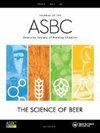Exploring the Sensory Characteristics of Virginia Ciders through Descriptive Analysis and External Preference Mapping
IF 1.8
4区 农林科学
Q4 BIOTECHNOLOGY & APPLIED MICROBIOLOGY
Journal of the American Society of Brewing Chemists
Pub Date : 2022-10-07
DOI:10.1080/03610470.2022.2119535
引用次数: 4
Abstract
Abstract The cider industry has experienced recent growth within the USA and Virginia in particular. However, the sensory characteristics and drivers of consumer acceptance of ciders are largely uncharacterized. Therefore, this work describes the sensory profiles of commercial Virginia ciders and links these to consumer acceptance. In study 1, a descriptive analysis (DA) of 24 representative ciders from 16 producers in Virginia was conducted: six panelists defined 48 descriptive terms for ciders. In study 2, a consumer acceptance study was conducted on eight ciders from the DA with 67 subjects. For the DA study, 22 descriptors were found to be significant, and multivariate analyses identified six groups. In the consumer study, external preference mapping was conducted to identify three clusters of consumers with distinctive patterns of sensor preference. The largest cluster favored sweet ciders without off-flavors; a second, smaller cluster favored sweetness even in the presence of off-flavors; and the smallest cluster disliked sweetness in ciders and was intolerant of off-flavors. These groups’ demographic and consumption profiles are described. All ciders’ basic chemistry was within previously reported ranges and expected relationships between flavor and chemistry were observed. We were able to establish sensory profiles for Virginia ciders and to tentatively link sensory profiles and consumer acceptance. Overall, this work adds to a small-but-growing body of knowledge about ciders’ sensory properties. Producers can use the sensory profiles in comparison to other regions’ ciders to establish regional sensory profiles and the consumer preference map to understand how to capitalize on their ciders’ distinct profiles.通过描述性分析和外部偏好映射探讨弗吉尼亚Ciders的感官特征
摘要苹果酒行业最近在美国尤其是弗吉尼亚州出现了增长。然而,消费者接受苹果酒的感官特征和驱动因素在很大程度上是不典型的。因此,这项工作描述了弗吉尼亚州商业苹果酒的感官特征,并将其与消费者接受度联系起来。在研究1中,对弗吉尼亚州16家生产商的24种代表性苹果酒进行了描述性分析:6名小组成员定义了48个苹果酒描述性术语。在研究2中,对来自DA的8种苹果酒进行了消费者接受度研究,共有67名受试者。在DA研究中,发现22个描述符具有显著性,多变量分析确定了6组。在消费者研究中,进行了外部偏好映射,以识别具有不同传感器偏好模式的三组消费者。最大的集群喜欢没有异味的甜苹果酒;第二个较小的簇即使在有异味的情况下也有利于甜味;最小的一簇不喜欢苹果酒中的甜味,也不耐异味。描述了这些群体的人口和消费概况。所有苹果酒的基本化学成分都在之前报道的范围内,并观察到风味和化学成分之间的预期关系。我们能够建立弗吉尼亚苹果酒的感官档案,并初步将感官档案与消费者接受度联系起来。总的来说,这项工作增加了关于苹果酒感官特性的少量但不断增长的知识。生产者可以使用感官档案与其他地区的苹果酒进行比较,以建立地区感官档案和消费者偏好图,从而了解如何利用其苹果酒的独特档案。
本文章由计算机程序翻译,如有差异,请以英文原文为准。
求助全文
约1分钟内获得全文
求助全文
来源期刊

Journal of the American Society of Brewing Chemists
工程技术-生物工程与应用微生物
CiteScore
4.00
自引率
20.00%
发文量
41
审稿时长
3 months
期刊介绍:
The Journal of the American Society of Brewing Chemists publishes scientific papers, review articles, and technical reports pertaining to the chemistry, microbiology, and technology of brewing and distilling, as well as the analytical techniques used in the malting, brewing, and distilling industries.
 求助内容:
求助内容: 应助结果提醒方式:
应助结果提醒方式:


